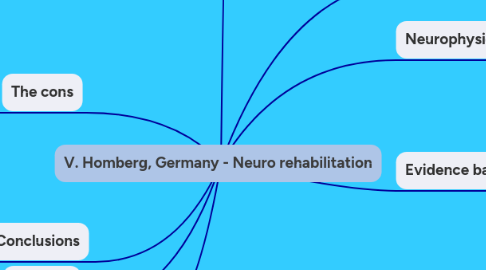
1. Motor recovery after stroke: a systematic review
1.1. langhorne
1.2. Link to paper
2. The Pros
2.1. High statistical reliability (esp in avoiding type I errors)
2.2. Power to compile results from multiple RCT (meta analysis)
2.3. Educates to be critical about claims of effectiveness
3. Conclusions
3.1. multiple evidence based therapy options available
4. The cons
4.1. Many more
4.2. Is there a way out of this dilemma?
4.2.1. the results form RCTs and MAs in the framework of EbM should be carefully interpreted
4.2.2. To avoid Type II errors believe more in positive than negative results of MAs
4.2.3. try to derive elementary rules from basic science
4.2.4. apply such elementary rules to invent therapeutic interventions
4.3. Rephrasing the epistemiological problem:
4.3.1. how can knowledge from relevant (basic) science help us
4.4. Rules from principles of motor learning
4.4.1. Untitled
4.4.2. Repetition
4.4.3. knowledge of results
4.4.4. feedback
4.4.5. etc.
5. "Training Techniques"
6. Neurophysiological basis?
6.1. In short: no...
7. Evidence based medicine
7.1. some historical background on topic
7.1.1. George Fordyce
7.1.2. James Lind
7.1.2.1. first clinical trial
7.1.3. Pierra C A Louis
7.1.4. Ignaz Semmelweis
7.1.5. David Sackett
7.1.6. Archie Cochrane
7.1.6.1. RCTs and critical summaries
7.2. Quality of study is the extent to which its design excludes bias
7.3. Nothing improves the performance of an intervention as much as the absence of a comparison group
7.3.1. Levels & Types of Evidence
7.4. Evidence based practice and the real world (after Davidoff)
8. Meeting notes by
8.1. Paul de Roos
8.1.1. www.twitter.com/paulderoos
8.1.2. www.paulderoos.com
8.2. Mindmap hosted on
8.2.1. www.neurologytraining.eu
8.2.1.1. Twitter:
8.2.1.1.1. www.twitter.com/trainneurology
8.3. Meeting
8.3.1. Controversies in Neurology
8.3.1.1. Linkt to website
8.3.2. Meeting Overview mindmap
8.3.2.1. Link to mindmap
